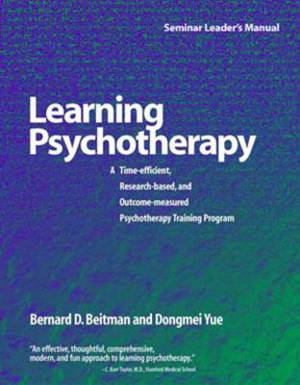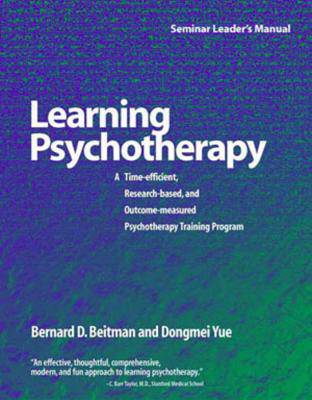
- Afhalen na 1 uur in een winkel met voorraad
- Gratis thuislevering in België vanaf € 30
- Ruim aanbod met 7 miljoen producten
- Afhalen na 1 uur in een winkel met voorraad
- Gratis thuislevering in België vanaf € 30
- Ruim aanbod met 7 miljoen producten
Zoeken
Learning Psychotherapy
A Time-Efficient, Research-Based, and Outcome-Measured Psychotherapy Training Program
Bernard D Beitman, Dongmei Yue
Paperback | Engels
€ 30,95
+ 61 punten
Uitvoering
Omschrijving
Each training program finds its own, sometimes idiosyncratic, niche and is not called to the task of demonstrating effectiveness. Those programs that offer structured training in key approaches tend not to present models that integrate the various schools.This book, along with the accompanying Seminar Leader's Manual and Learning Psychotherapy Vignettes videotape, provides a much-needed foundation for training beginning psychotherapists in the crucial elements of psychotherapy. Unlike other programs, it is low on reading volume and high on homework. The homework includes rating transcripts according to standard research scales, discerning dysfunctional patterns from written and videotaped case vignettes, and analyzing transference and countertransference in actual sessions. Participants proceed through six modules: (1) verbal response modes and intentions, (2) working alliance, (3) inducing patterns, (4) change, (5) resistance, and (6) transference and countertransference. Pre- and post-training modules offer the opportunity to measure the effects of training.The Learning Psychotherapy program has been endorsed by the American Psychiatric Association as "an example of innovative training in the fundamentals of psychotherapy, with built-in assessment that is consistent with the objectives of the Commission on Psychotherapy by Psychiatrists and the APA to strengthen the psychotherapy education of future psychiatrists."The program has been piloted in the psychiatric residency training program at the University of Missouri-Columbia for four years, at Stanford University for two years, and at several other sites across the United States.
Specificaties
Betrokkenen
- Auteur(s):
- Uitgeverij:
Inhoud
- Aantal bladzijden:
- 96
- Taal:
- Engels
Eigenschappen
- Productcode (EAN):
- 9780393703054
- Verschijningsdatum:
- 17/05/1999
- Uitvoering:
- Paperback
- Formaat:
- Trade paperback (VS)
- Afmetingen:
- 201 mm x 257 mm
- Gewicht:
- 199 g

Alleen bij Standaard Boekhandel
+ 61 punten op je klantenkaart van Standaard Boekhandel
Beoordelingen
We publiceren alleen reviews die voldoen aan de voorwaarden voor reviews. Bekijk onze voorwaarden voor reviews.











